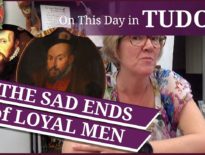On this day in Tudor history, 27th February 1601, Benedictine monk Mark Barkworth (also known by the alias Lambert), Jesuit Roger Filc*ck, and widow Anne Line were executed at Tyburn.
Barkworth and Filc*ck had been found guilty of treason for being priests and were given the full traitor's death, i.e. they were hanged, drawn and quartered. Anne Line was sentenced to death for harbouring a priest and was hanged.
Find out more about these Catholics, who were victims of Queen Elizabeth I's legislation against Jesuits, in today's talk.
Also on this day in Tudor history, 27th February 1545, the Battle of Ancrum Moor, part of the War of the Rough Wooing, took place near Jedburgh in Scotland. Find out all about it in last year’s video:
Also on this day in history:
- 1531 – Birth of Roger North, 2nd Baron North, politician, diplomat and administrator at the court of Elizabeth I. North served as a Member of Parliament, Privy Councillor and Treasurer of the Household.
- 1555 – Death of Sir William Babthorpe, Member of Parliament and a man who was created Knight of the Bath at the coronation of Edward VI in 1547. Babthorpe had originally been on the rebel side in the Pilgrimage of Grace in 1536, but fortunately swapped sides.
- 1574 – Death of Sir William Harper, Lord Mayor of London, in London. He was buried in St Paul's, Bedford, in the chancel. He was Lord Mayor from September 1561 to his death.
- 1583 – Death of Richard Madox, diarist and Church of England clergyman, near Espirito Santo harbour, near Vitória, Brazil. He was Chaplain and Secretary to Captain Edward Fenton on his 1582 voyage to the Moluccas and China. Madox's last diary entry was 31 December 1582. It is thought that he was buried at sea.
Transcript:
On this day in Tudor history, 27th February 1601, Mark Barkworth (also known by the alias Lambert), a Benedictine monk, was hanged, drawn and quartered, dressed in the habit of the Benedictine order, at Tyburn. Two others died that day: Jesuit Roger Filc*ck, and Anne Line, a widow who had harboured priests. Barkworth was beatified in 1929, Line was canonised in 1970 and Filc*ck was beatified in 1987.
Bishop Richard Challoner gives a biography of Barkworth in his book “Memoirs of missionary priests, and other Catholics of both sexes, that have suffered death in England on religious accounts from the year 1577 to 1684”. He explains that Barkworth was a Lincolnshire man who was brought up as a Protestant. He converted to Catholicism when he went abroad at the age of twenty-two and was instructed in the faith by a Flemish Jesuit at Douai. Barkworth travelled on to Spain and was ordained at the English College at Valladolid in 1599. He was then sent on a mission to England but was apprehended as soon as he had arrived there. He was tried for treason, for being a priest, and was found guilty and condemned to death.
Roger Filc*ck, who also died that day, hailed from Sandwich in Kent. Challoner writes that he was educated at Douai or Rheims and then Valladolid, where he was ordained. He wanted to become a Jesuit priest and so was sent on a mission to England in 1598 to prove himself. After two years in England, Father Henry Garnet agreed to admit him into the Society of Jesus and it was planned that Filc*ck would travel to Flanders to be admitted as a Jesuit novice. However, he was arrested and imprisoned in Newgate. He was tried on 23rd February 1601 and found guilty of treason for being a priest. He was condemned to death.
On this day in Tudor history, 27th February 1601, Barkworth and Filc*ck were drawn from Newgate to Tyburn on the same hurdle. Challoner gives an account of what happened then:
"When they were put up into the cart, Mr. Barkwork, with a joyful accent, sung those words of the royal prophet, hoec dies quam fecit Dominus, exultemus; and Mr. Filc*ck went on in the same tone, & loetemur in ea. Then Mr. Barkworth declared how ready he was to lay down, even a thousand lives, if he had them, for his faith; and protested, that he forgave, with all his heart, the queen, and all that were any ways accessary to his death, and wished to have them with him in eternal glory. Then he recommended himself to the prayers of the catholics, and the cart was drawn from under him. Here some cruel wretch, fearing lest the weight of his body should put the martyr too soon out of his pain, for he was tall and bulky, set his shoulders under him to bear up, at least, some part of that weight; so that he was cut down whilst he was yet alive; and even when the butcher was seeking for his heart, he pronounced these words, O God be merciful to me."
Challoner goes on to say that Barkworth's head was kept by the English Benedictines at their convent in Douai.
Regarding Filc*ck's end, Challoner records that Barkworth "was first butchered, before the eyes of father Filc*ck; who, so far from being discouraged or terrified with that scene of blood, took occasion from thence of more heartily aspiring after the like felicity; crying out with the apostle, I desire to be dissolved, and to le with Christ. His desire was not long deferred: when, after a short prayer, he chearfully yielded himself up to the executioner; and the cart being drawn away, he was hanged, and then cut down, dismembered, bowelled and quartered."
Anne Line was a widow who suffered with regular headaches and “dropsy” but whose “soul was strong and vigorous”. On Candlemas Day 1601, 2 February, Anne's house was raided after it was suspected that she was harbouring priests. Father Francis Page, who had been about to celebrate mass with her, was able to escape, but Anne was still taken to prison. She was tried at the Old Bailey by judge Sir John Popham and she was so weak that she had to be carried to her trial in a chair. She was sentenced to death for harbouring a priest, although no priest had been found at her house. She was executed before Barkworth and Filc*ck, and Challoner writes:
"At Tyburn, when she was just ready to die, she declared to the standers-by with a loud voice: "I am sentenced to die for harbouring a catholic priest; and so far I am from repenting for having so done, that I wish, with all my soul, that where I have entertained one, I could have entertained a thousand". She suffered before the two priests; and Mr. Barkworth, whose combat came on the next, embraced her dead body whilst it was yet hanging, saying, "O! blessed Mrs. Line, who hast now happily received thy reward. Thou art gone before us; but we shall quickly follow thee to bliss, if it please the Almighty.""
Filcok had been Anne's confessor and friend.
So, on this day in 1601, three Catholics were executed in the reign of Queen Elizabeth I.



Leave a Reply